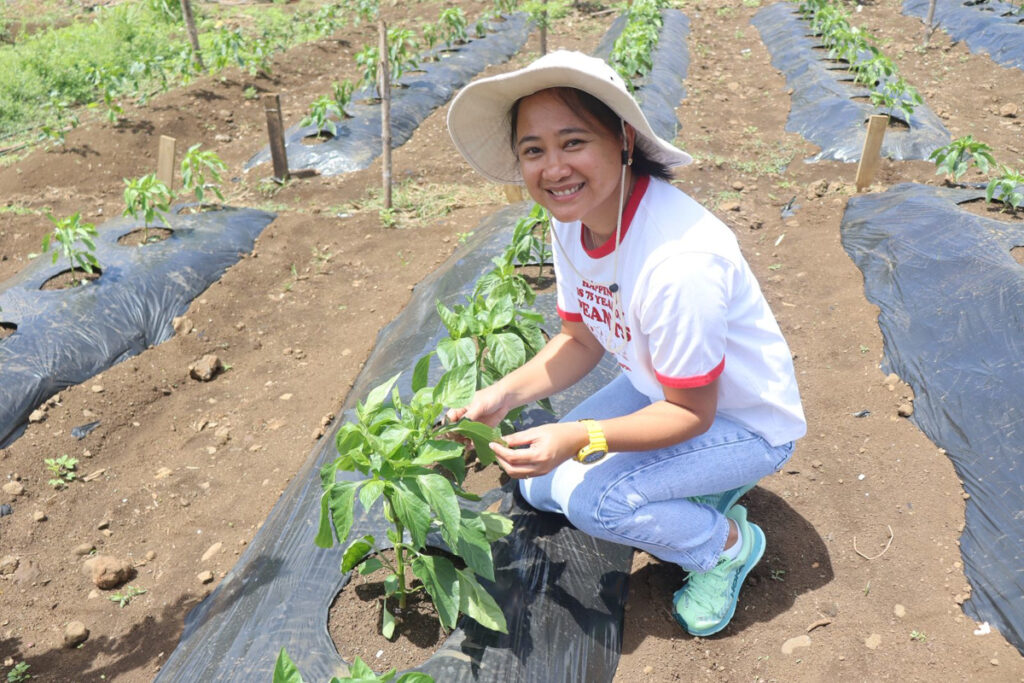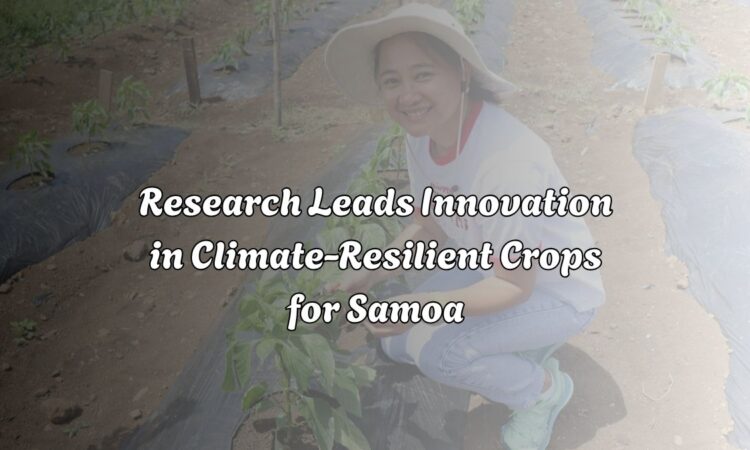Dr Leslie Toralba Ubaub, a Lecturer in the Discipline of Agriculture and Food Technology at The University of the South Pacific (USP) Samoa Campus, has been awarded the 2025 Vice-Chancellor and President’s (VCP) Strategic Fund for Female Academics to advance her groundbreaking research on screening heat-tolerant tomato and capsicum varieties suited to Samoan conditions.

The grant provides Dr Ubaub with six months of teaching release time to focus on publishing and disseminating her research findings, which address one of the Pacific’s most pressing agricultural challenges – the impact of climate change on crop production, pests, and diseases.
This grant is both a privilege and a sacrifice. It gives me the opportunity to focus on writing and sharing research that can help improve food security in Samoa, while also recognizing the important role of women balancing teaching, research, and family responsibilities.
Dr Ubaub

Her research builds on two major projects funded under the Pacific Agriculture Scholarships, Support and Climate Resilience (PASS-CR) program through ACIAR, and the PEGASUS ‘Take-It-Further‘ Project under the Future Earth Organization, funded by the Gordon and Betty Moore Foundation.
The research evaluates heat-tolerant tomato and capsicum lines developed by the World Vegetable Center in Taiwan, assessing their suitability to Samoan growing conditions in partnership with Sunshine Pacific Ltd. The work aims to address the limited availability of quality, locally produced planting materials, which have long hindered vegetable production and led to high import dependence.
Developing locally adaptable, open-pollinated varieties will ensure that farmers have access to affordable, reliable seeds and reduce reliance on costly hybrid imports
Dr Ubaub explained.
Key aspects of her research include:
- How shifting weather patterns affect the yield and quality of vegetable crops in
Samoa. - Analyzing changes in pest populations and disease outbreaks under varying
climatic conditions. - Exploring how local farmers understand and respond to climate-related
challenges. - Identifying sustainable, climate-resilient approaches to safeguard vegetable
production.
A passionate entomologist and beekeeper, Dr Ubaub first explored the intersection of climate change and entomology through her 2023 Future Thinker’s Award project, which examined the effects of extreme temperatures on pollinators and plant reproduction. With continued support through subsequent grants, her work has evolved into a comprehensive study linking pollination, pest management, and heat tolerance in vegetables.
From the 10 tomato and 12 capsicum lines initially screened, five promising heat-tolerant lines have been selected and are currently being evaluated in farmers’ fields.
The findings will guide the next phase – mass production and distribution of open-pollinated seeds by USP’s Discipline of Agriculture and Food Technology, in collaboration with Sunshine Pacific Ltd.
Through these projects, Dr Ubaub has expanded her professional network, collaborating with leading agricultural scientists, including Professor Daniel Tan (University of Sydney) and Drs Derek Barchenger and Assaf Eybishitz (World Vegetable Center, Taiwan).
The research has also supported capacity building at USP, involving laboratory technician and Master’s student Michael Sefilino, along with several student interns.
The University of the South Pacific continues to strengthen its leadership in applied agricultural research through initiatives such as Dr Ubaub’s, which align with USP’s mission to promote innovation, resilience, and sustainable livelihoods in Pacific communities.
Beyond scientific trials, Dr Ubaub’s project places strong emphasis on community engagement. Local farmers in Samoa have been active partners in field evaluations, sharing traditional knowledge and insights into how weather patterns, pests, and soil conditions affect their crops. This collaborative approach ensures that research outcomes are not only academically robust but also practical and immediately beneficial to farming communities.
The pandemic highlighted how critical local food production is for island nations. This research is a step towards ensuring that Samoan farmers have access to seeds that are affordable, available, and resilient to climate change.
Dr Ubaub
Dr Ubaub’s recognition through the VCP Strategic Fund also highlights USP’s ongoing efforts to empower women researchers in science and technology. By providing dedicated support and mentorship, the initiative enables women academics to lead high-impact research and inspire the next generation of Pacific scientists.
The project has also provided valuable hands-on learning opportunities for USP students, particularly those pursuing agriculture and environmental science. Through laboratory work, data collection, and field trials, students have gained exposure to applied research methods – strengthening the University’s role in cultivating future leaders in agricultural innovation.
The next phase of the project will focus on expanding field trials to different agro-climatic zones across Samoa and neighboring Pacific Islands. Dr Ubaub and her team also plan to work closely with local seed producers and government agricultural agencies to establish a sustainable system for community-based seed multiplication and distribution.

